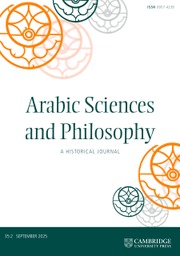Article contents
The Political Teaching of Averroes*
Published online by Cambridge University Press: 24 October 2008
Extract
Though much has been written of late about Averroes and his philosophy, little attention has been paid to his political teaching. Generally speaking, his works can be divided into two categories: (a) commentaries on Aristotle and other important thinkers and (b) occasional treatises written to resolve particular questions. The subject of this essay, his political teaching, is stated most directly in the first classification of writings – especially in his commentaries on Aristotle's Rhetoric and Plato's Republic. Even though the second kind of writings helps to nuance some of his broader themes — especially the two treatises having to do with the relationship between philosophy anddivine law, namely, the Decisive Treatise and its sequel Kashf an manāhij al-adilla — considerations of space preclude an analysis of them here. Our examination of the first two writings will focus primarily on what Averroes has to say about the different kinds of political regimes and, above all, the best regime, for his discussion of it leads him to reflect more generally on other major political questions.
- Type
- Research Article
- Information
- Copyright
- Copyright © Cambridge University Press 1992
References
1 See Averroes, , Talkhīṣ kitāb al-khaṯāba, ed. Badawī, 'Abd al-Raḥmān (Cairo, 1960), 1.4.33:1–14, 33:17–34:1, 39:8–9; 1.7.67:15–19; and 1.8.71:5–7. Henceforth, this work will be cited simply as Khaṯāba. See also Aristotle, Rhetoric, 1.4.1359a30–39, 1359b1–8, 1360a38; and 1.8.1366a18–21.Google Scholar
2 Note also that in his final statement about aristocracy (Khaṯāba, 1.8.70:7), Averroes says that its goal is “virtue and holding fast to law” (al-faḍīa wa al-tamassuk bi-al-sunna). Averroes' use of sunna here is in keeping with the way the Greek nomos (p1. nomoi) is rendered in the old Arabic translation of Aristotle's Rhetoric;Google Scholar see Arisṯūṯalīs, al-Khaṯāba, al-tarjama al-'arabiyya al-quadīma, ed. Badawī, 'Abd al-Raḥmān (Cairo, 1959), 37:7–10. Though tempted to insist on the core meaning of sunna and translate it as “traditional law” whenever it occurs, I gratefully accept the discerning suggestion of M. Maroun Aouad that the larger context argues for Averroes having used the term is a looser sense (see Khaṯāba, 1.8.69:20–70:3).Google Scholar
3 The reflections that follow have been set out more fully in my Philosophy, Ethics, and Virtuous Rule: A Study of Averroes' Commentary on Plato's “Republic”, Cairo Papers in Social Science, Vol. 9, Monograph 1 (Cairo, 1986), esp. pp. 69–90.Google Scholar
4 See Averroes on Plato's “Republic”, trans. Lerner, Ralph (Ithaca, 1974), 80:18–19. Page and line references are to the edition of the Hebrew text, the Arabic not being extant;Google Scholar see Averroes' Commentary on Plato's “Republic”, ed. and trans. Rosenthal, E.I.J. (Cambridge, 1956). As will become immediately evident, references to Averroes' Commentary are simply to Republic, whereas all references to Plato's Republic are so identified.Google Scholar
5 These laws are identified as nomoi (Hebrew nīmūsīm, i.e., Arabic nawāmīs) or conventional laws, rather than as divine laws (Hebrew tōrōt, i.e., Arabic sharā'i'). In fact, the term usually used for divine law is frequently presented here with the adjective “human” and thus called “human divine laws” (Hebrew tōrōt enōshiyōt, i.e., Arabic sharā'i'). The Hebrew word used here to render what must have been the Arabic sunna is heq rather than halahah, which does not occur at all.Google Scholar
6 See preceding note and consider that if a “legal king” (malik al-sunna ) is one who merely applies the nomoi of a founder, then Averroes must be suggesting a basic affinity between nomoi and sunan. And, given that founders usually set down laws that are more on the order of sharā'i' than ones on the order nomoi, he moust also be suggesting a basic affinity between nomoi and these other kinds of laws.Google Scholar
7 To be sure, Averroes does not admit that he has enumerated eleven kinds of regime. Indeed, the rule of the philosopher-king and of philosopher-rulers are meant to be two aspects of the rule of the best and to comprise the regime of the “king simply,” that is, “the truly royal governance,” that of the “select rulers,” as well as that of the “legal king.” Consequently, when Averroes concludes that he has enumerated only eight regimes, he must mean the original four imperfect regimes (timocracy, oligarchy, democracy, and tyranny), the two good regimes (the “king simply” or the philosopher-king and the “select rulers” or the philosopher-rulers as well as the “legal king”), and then the regime of the pleasure-seeker as well as that directed at securing what is needed for survival. But, as will be explained in what follows immecliately, the regime of the pleasure-seeker is to be encompassed within oligarchy thus suggesting that these eight regimes are really only seven. In dwelling on the ambiguity, then, I only seek to draw attention to the several considerations suggested by Averroes' unusual procedure.Google Scholar
8 See above, n. 7 and note that if the “truly royal governance” is subsumed under the first “primacy,” we must then investigate how – even whether – the rule of individuals guided by revelation ultimately differs from that of those not so guided.Google Scholar
- 6
- Cited by


